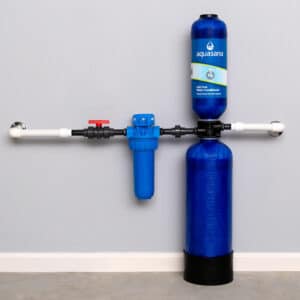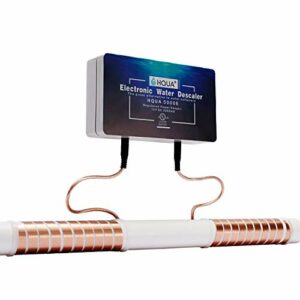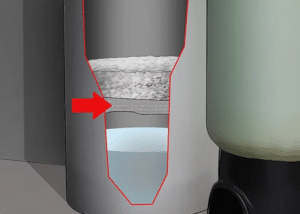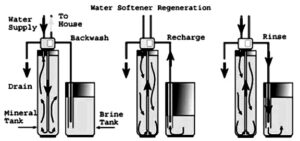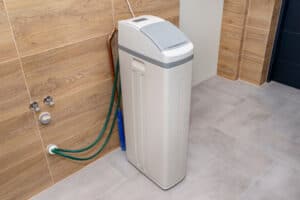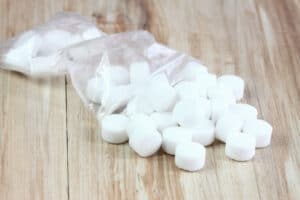Water softener salt is a vital component of a water softening system that provides you and your family with soft, clean water.
Not all water softener salts are the same. Understanding the different types will help you choose the right one for your home’s water system.
In this article, we’ll discuss five types of water softener salts, including some pros and cons.
What Is Water Softener Salt?
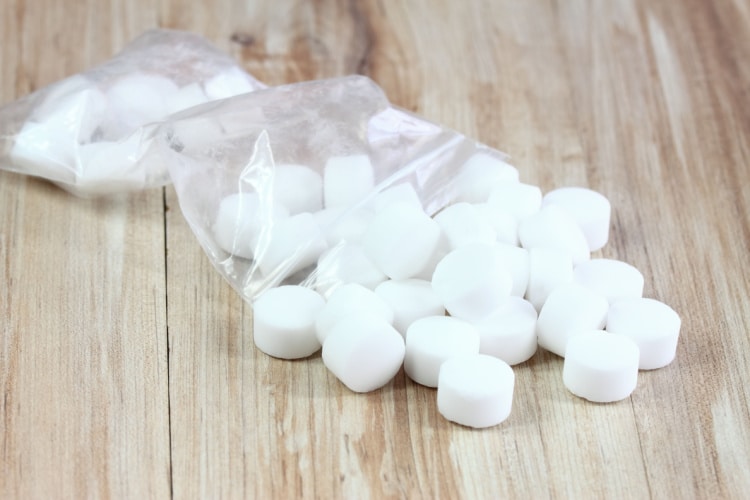
Water softener salt comes in different chemical makeups, such as sodium chloride, calcium chloride, and magnesium chloride.
You can use water softener salts if the water in your home is too “hard.”
Hard water is the term for water that contains excessive amounts of minerals such as magnesium and calcium. While these minerals are not unsafe for consumption, they can cause problems for you and your home.
Common symptoms of hard water include:
- Clogged plumbing pipes
- Mineral deposits around your faucets and showerhead
- Residue in your hair
- Dried out skin
- Odd tasting water
We use water softeners to remove minerals from water and resolve the above mentioned issues. Using the correct type of water softener salt for your system ensures your home’s water softener, plumbing, and appliances will run properly for years.
Different Types of Water Softener Salt
You can find many types of water softener salt for sale, each with its own pros and cons.
Evaporated Salt
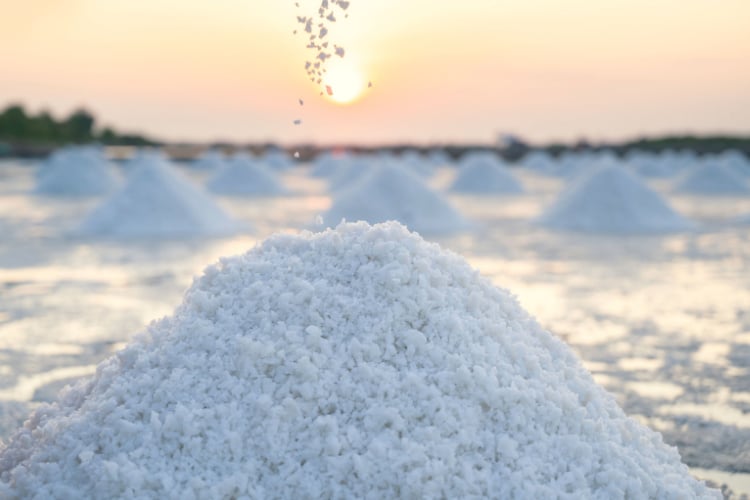
Manufacturers create evaporated salt through a process of steam evaporation. The resulting product is salt in a crystallized form. The manufacturer then dries the salt crystals and forms them into pellets.
Evaporate salt is a favorite choice for many homeowners because the evaporation process distills the salt so that the pellets are as much as 99.99% pure salt.
Pros of Evaporate Salt
Evaporated salt is generally the purest type of water softener salt, meaning there is less water-insoluble material in the salt. Because of its purity, evaporated salt requires less strict maintenance of water softening equipment.
Evaporated salt doesn’t form salt bridges or get as mushy as other forms of water softener salt. With evaporated salt, your water softening equipment will run efficiently and last longer.
Cons of Evaporate Salt
The only significant disadvantage of using evaporated salt is that the material often costs significantly more than less pure water softener salt options.
However, weighing the initial costs of evaporated salt versus the ongoing expenses of cleaning and maintaining your softening equipment after using low-quality salt may still make the higher purchase price more cost-effective in the long term.
Rock Salt
Rock salt is the most affordable water softening salt you can use in a water softening system. Companies pull rock salt from underground salt deposits. Because of its origins and the extraction process, rock salt is often full of other mineral deposits, such as calcium sulfite or magnesium.
Rock salt normally comes in small rock or pebble form, and manufacturers use minimal processing to prepare rock salt for water softener systems.
Pros of Rock Salt
The most significant advantage of rock salt is that it is more affordable than any other type of water softener salt. Rock salt is also available in many stores, so it is incredibly easy to find in most locations.
If economical upfront costs and frequent, ongoing maintenance are more manageable for you compared to the high initial purchase cost of a water softener such as evaporated salt, consider using rock salt.
Cons of Rock Salt
While it’s affordable, rock salt is also the least pure water softener salt. Rock salt is frequently rich in insoluble minerals such as calcium sulfite. Calcium sulfite reduces the effectiveness of rock salt and leads to more frequent clogs and maintenance issues.
Solar Salt
Solar salt, also called sea salt, is named for the process by which it is collected. Solar salt comes from seawater that companies evaporate using the heat of sunlight. It is a highly pure form of salt and dissolves incredibly well compared to other types of water softener salt.
You will most frequently find solar salt sold in crystal, pellet, or block form.
Pros of Solar Salt
If you are environmentally conscious, solar salt is a good option because it’s collected using a renewable energy source, i.e., sunlight. Solar salt is remarkably more eco-friendly than other sources, such as rock salt, which relies on potentially harmful salt mining practices.
Solar salt is a highly pure (99.6% or more) salt that results in less mineral buildup than less pure salt forms such as rock salt.
Cons of Solar Salt
While solar salt is purer than rock salt, it is less refined than evaporated salt. With around 0.3-0.4% insoluble materials in it, solar salt will not dissolve as readily as a 99.99% pure evaporated salt.
Quality standards differ between brands of solar salt. If you choose to use solar salt, you will need to compare brands to find one with the level of purity you require.
Also, while solar salt is more affordable than evaporated salt, there are more affordable options. Solar salt is significantly more expensive than rock salt.
Potassium Chloride (Non-Salt)
Potassium chloride is a salt alternative that many people use to help grow plants and flowers, but it is also effective for treating hard water. Potassium chloride comes in pellet form.
While sodium chloride removes mineral deposits in your water through an ion-swapping process, potassium chloride functions as a “water conditioner.” It crystallizes mineral concentrations to prevent scaling instead of genuinely removing the minerals.
You might choose potassium chloride if someone in your house has dietary restrictions or a sodium sensitivity. Potassium chloride is usually about 99.9% sodium-free.
Pros of Potassium Chloride Salt
The primary reason homeowners choose to use potassium chloride in the water softening system is because of health concerns related to sodium.
Cons of Potassium Chloride Salt
While potassium chloride can help reduce overall dietary sodium intake, it is the most expensive water softener material. Potassium chloride can cost as much as 3 to 5 times as much as sodium chloride options. Potassium chloride is also more challenging to find than other options, such as evaporated or rock salts.
Using potassium chloride also requires you to add more pellets to your softener compared to using sodium chloride. Using this extra material further compounds the cost of potassium chloride.
Bottom Line: Which Water Softener Salt Is Right for You?
The best water softener treatment for most households with hard water is sodium chloride.
Even though it is more expensive than other options, evaporated salt is the best water softener because of its extremely high purity level. If you’re looking for an option that offers excellent performance and reduced need for maintenance, evaporated salt is the way to go.
For homeowners on a budget, the most affordable option is rock salt. It is a readily available material that provides good water softening performance. However, rock salt will cause some mineral buildup and require more maintenance.
Solar salt is the perfect choice for an eco-friendly option since it is collected using renewable sunlight and provides a highly pure salt composition that’s effective as a water softener.
Or, if you have concerns about sodium intake, consider using potassium chloride as a “non-salt” alternative. Potassium chloride is effective but is also the most expensive option for water softener salt.

